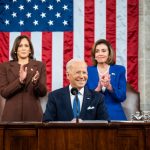The latest episode of token conservative Nicolle Wallace’s career unfolds in a bewildering fashion, this time on NBC’s “Late Night with Seth Meyers.” Wallace, who once pretended to hold conservative values while working for campaign giants like John McCain and George W. Bush, has declared an impending election emergency—specifically, the urgency of voting for Kamala Harris. One has to wonder, who exactly considers this an emergency?
Wallace’s claims stem from a fear of a potential Trump return to the Oval Office. In her worldview, voting for Harris is not merely a choice but a crisis point. It is clear from her rhetoric that the emergency in question seems to revolve around a leftist agenda that includes everything from unrestricted abortion rights to the bizarre normalization of gender ideology among children. There’s a unique irony in her urgency when it seems to be primarily concerned with safeguarding the extreme left’s agenda against the principles that many conservative Americans hold dear.
MSNBC's 'Devastated' Nicolle Wallace Carps That Voting for Harris Is an 'Emergency.' For Whom? #RedState pic.twitter.com/V41YLRR4U6
— Ian Hansen News 🇺🇸🇺🇸 (@IanHansenNews) October 30, 2024
During her chat with Meyers, Wallace expressed dismay over what she perceives as a dramatic shift in American political values. Yet, she fails to realize that her bitterness largely stems from a personal inability to accept that the political landscape has evolved, perhaps to reflect the desires and beliefs of many Americans who are tired of the elitist perspective championed by figures like her. The façade of being a former Republican is falling away; the leftist mentality is the only one that shines through, and her desperate attempts to disguise it are becoming less convincing by the day.
Meyers humorously attempted to dredge up a semblance of credibility for Wallace by mentioning her past campaign experiences, but this only highlighted the growing chasm between her once-held beliefs and her current rhetoric. Reflecting on her ‘devastation,’ one can’t help but chuckle at her deep-seated concerns about societal progressives cheering for political viewpoints that she, and many of her kind, now loathe. Surely, the feeling of being “gutted” is shared by many conservatives who see their values dismissed and belittled by such media personalities.
In her panic-stricken conclusion, Wallace lamented that voting for Kamala Harris felt like an emergency, leading to a spectacular campaign run by Harris. This is rich, considering the widespread acknowledgment that Harris’s campaign has hardly been stellar by any measure—not to mention that many would argue that it is one of the most divisive elections in recent memory. If anything represents an actual emergency, it is the radical left’s incessant push for policies that undermine the very fabric of American society.
As Wallace’s career drifts further from any semblance of conservative ideology, more Americans are recognizing the farce that is the left’s notion of unity and bipartisanship. Wallace’s panic, wrapped in humor by Meyers, does little to mask the reality: conservative America is waking up, and the left’s grip on perception is slipping. She describes the supposed “nonpartisan” election is quite the opposite, and the determination of the right to protect foundational values has never been stronger.




